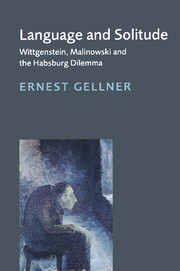Book contents
- Frontmatter
- Contents
- Preface
- Foreword
- Part I The Habsburg dilemma
- Part II Wittgenstein
- Part III Malinowski
- Part IV Influences
- Part V Conclusions
- 35 The truth of the matter
- 36 Our present condition
- General bibliography
- Bibliographies of Ernest Gellner's writings on Wittgenstein, Malinowski, and nationalism
- Index
36 - Our present condition
Published online by Cambridge University Press: 05 March 2010
- Frontmatter
- Contents
- Preface
- Foreword
- Part I The Habsburg dilemma
- Part II Wittgenstein
- Part III Malinowski
- Part IV Influences
- Part V Conclusions
- 35 The truth of the matter
- 36 Our present condition
- General bibliography
- Bibliographies of Ernest Gellner's writings on Wittgenstein, Malinowski, and nationalism
- Index
Summary
The central problem facing contemporary societies, or group of problems, arises not from the existence of either of these social types in themselves, but from the tensions generated by the shift from one to the other and by their coexistence within what are, by other and obvious criteria, single societies. Once upon a time mankind lived, by and large, in closed intimate communities, governed by practices simultaneously geared both to maintaining internal order and adjusting to nature (with the former consideration, however, predominating). The criteria adapted for judging the acceptability of practices – morally, technically, ritually, grammatically, sartorially, what you will – were, so to speak, self-validating, traditional. They were not systematised; no attempt was to deduce them either from some supposedly self-evident general premise or from some single authoritative revelation. So, by and large, such communities conformed to the model elaborated by the organic or romantic theorists.
Then, one day, a new style of cognition emerged, which separated the referential inquiry into nature from the concern with internal social harmony and which, by means which are still only partly understood, succeeded in acquiring astonishingly accurate, general, and consensussecuring understanding of the environment. Those who questioned the authority of the new science were in the end effectively silenced by the unbelievable power of the technology based on it, which completely transformed the human condition. It also transformed human society, replacing societies made up 90 per cent or more of peasants – agricultural workers living close to destitution and surviving precariously by the sweat of their brows – by relatively affluent societies made up of literate specialists moving fairly freely between a variety of occupations.
- Type
- Chapter
- Information
- Language and SolitudeWittgenstein, Malinowski and the Habsburg Dilemma, pp. 189 - 191Publisher: Cambridge University PressPrint publication year: 1998



